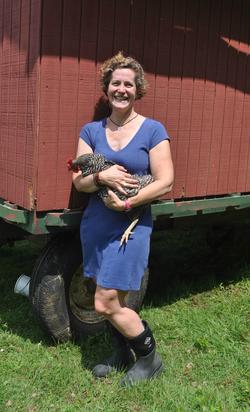
The beauty of Massachusetts Audubon sanctuaries is how deeply rooted they are in their individual communities. Habitat is no exception. Belmont citizens have helped shape Habitat’s programming and gardens and seek solace in its wooded paths and intimate landscape. Renata Pomponi, who is now managing Habitat, understands how special Habitat is, for the natural habitat it protects and the community that considers it their own. It is a true sanctuary within Boston’s metropolitan area.
I spoke with Pomponi briefly last month, and she explained how her role came to be.
* * *
With COVID-19 and the cancelation of programs across the state, Mass Audubon faced—and continues to experience—tremendous financial loss, necessitating the reduction of staff. Prior to the pandemic, Mass Audubon had been strategizing a new model for management of its sanctuaries that would help it achieve statewide goals around climate action, education, ecological management, and equity. This “‘hub-and-spoke”’ model, increasing efficiency, conservation impact, and collaboration between sanctuaries, emerged as the solution to both challenges.
Under the new model, Pomponi, who has been Drumlin Farm’s sanctuary director for the past five years, is now director of Mass Audubon’s Metro West hub. In addition to Habitat, the Metro West hub includes Brewster’s Woods in Concord, Broadmoor in Natick, and Drumlin Farm in Lincoln. Pomponi is excited about the additional resources the new model makes available to Habitat. For instance, Sandy Vorce, the long-time property manager—“who has been outstanding managing the property and coordinating volunteers,” Pomponi said—will collaborate with Metro West staff such as Tia Pinney, ecological manager at Drumlin, and Pam Sowizral, head of volunteer recruitment and management at Drumlin. As Pomponi explained, the hub-and-spoke model allows Mass Audubon to “better deploy the resources we have.”
The question on the minds of many in Belmont is, What will stay the same at Habitat? Will we see changes? Pomponi seems to understand the cherished place that Habitat holds in the broad neighborhood. As a former teacher/naturalist, she is also aware of the threats to its habitat. For instance, during the period when Mass Audubon had to close down access to sanctuaries, staff reported “a resurgence of wildlife” that was also noticed by nature photographers when the property reopened.
Local residents are wondering, Can we still walk our dogs in Habitat? The question is still under deliberation, but the area open to dog walking may be reduced. Pomponi explains that people drive from surrounding areas to walk their dogs, treating it as a “recreational dog park.” (One byproduct of those visits was that the staff had to deal with two enormous trash barrels of dog waste every week.) Charged with protecting nature for wildlife and people, Pomponi is seeking a solution which will reduce the degradation of wildlife and habitat while attending to the concerns of its neighborhood.
Asked about the role she envisions for Habitat in relation to the organization’s goals, Pomponi spoke about deepening and growing what Habitat already is doing well, with the Habitat Intergenerational Program—“a terrific program”—as an example. Similarly, Habitat’s pre-school naturalist program, which to date has been available to families a few hours a day, a few days of the week, could conceivably become more available to more diverse families by being a full-day, weekly program. She spoke about Habitat’s proximity to urban settings and its “tremendous potential to invite access to nature.”
Pomponi also hopes to expand the reach of Mass Audubon’s Youth Leader for Climate Justice program in Belmont and surrounding area schools. As part of that program, Habitat educators led a group of 16 teens from five communities, who called themselves HEAT (Habitat Environmental Action Team). The students worked with similar teen groups at other sanctuaries including Drumlin Farm, the Boston Nature Center, and Broad Meadow Brook in Worcester to define and implement climate action programs in their own communities. While COVID-19 cut short their work last spring, Pomponi and Mass Audubon are looking forward to seeing the program grow at Habitat and increasing its impact as part of a statewide effort.
Pomponi was quick to note that there is no intention to dramatically increase visitation and traffic to Habitat. She cited Drumlin Farms as the nearby sanctuary with “the parking and the staff” to allow for that. Instead, she is hoping to see more engagement in deeper ways that are appropriate for Habitat.
And when we are once again able to visit together, Pomponi is looking forward to meeting more of Habitat’s neighbors, visitors, and volunteers.
Nora Huvelle has lived in Belmont since 2003 when she moved from neighboring Watertown. She has served on the Mass Audubon Board and is chair of the Farm School board.



Sorry, the comment form is closed at this time.